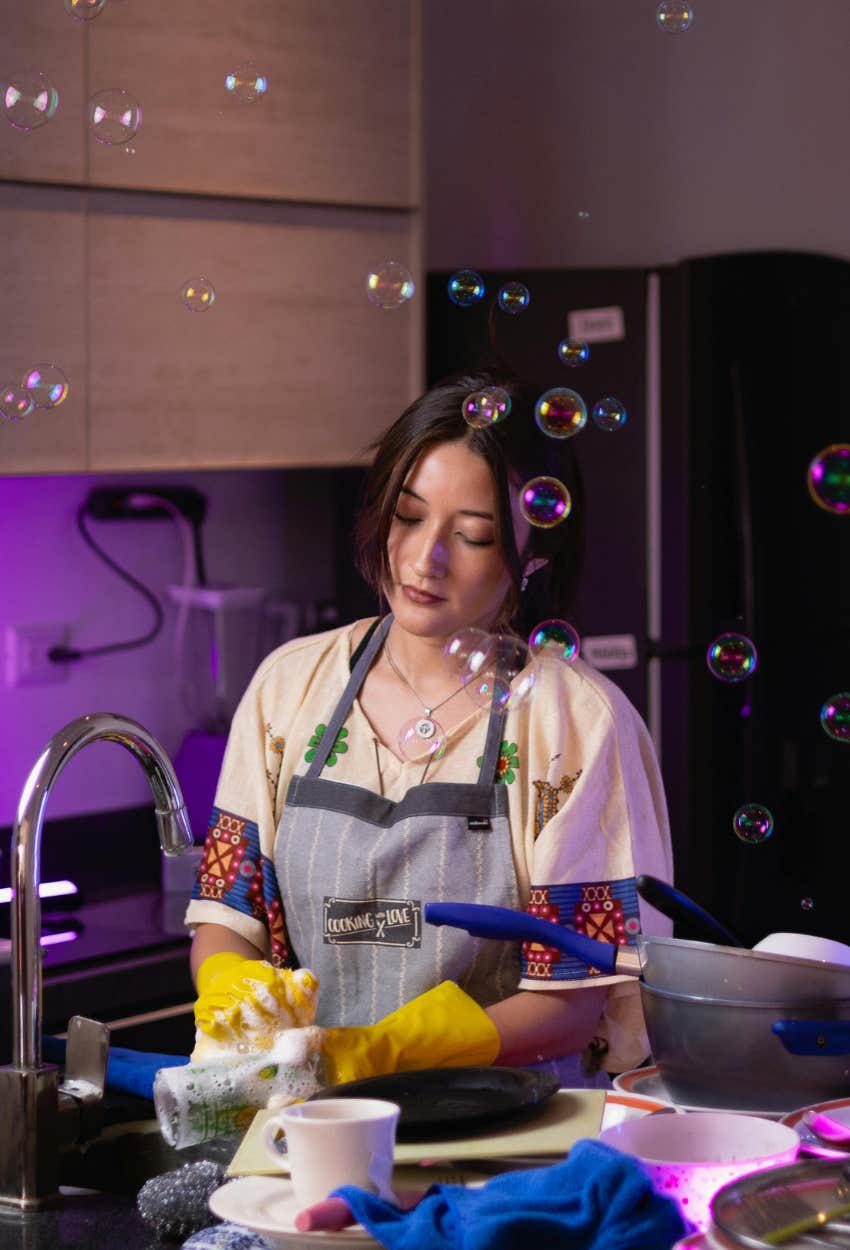People Who Do This One Annoying Task The Old-Fashioned Way Are Happier & Way Less Stressed, Says Study
Yeah, it's definitely annoying.
 Annie Spratt | unsplash
Annie Spratt | unsplash If you could eliminate household chores from your daily life, you'd be a happier and less stressed person, right? Maybe not. Hear me out. A 2014 study found that handwashing dishes can actually be good for your overall well-being.
If you're rolling your eyes, you're certainly not alone. Doing the dishes isn't exactly on most people's shortlist of activities that scream a good time, but the science backs it up. And hey, as long as putting said dishes away isn't part of the task, I'm actually open to these findings.
A study found that washing dishes by hand can make you happier and less stressed.
Here's the thing. I'm really good at washing dishes. When I wash the dishes, there's never any old food residue clinging to my pristine dishes, nor are there any remnants of soap on my glasses. Sometimes when I'm feeling especially hardcore, I use scalding hot water because that's how it's done in a dishwasher.
I also put my dishes on the rack in descending order by size. I'm not a neat freak and I don't have OCD, I'm just really good at doing dishes and am a tiny bit annoying about it. So I felt completely validated when I learned that washing dishes can actually be good for you when performed in a very specific way.
 Alejandro Reyes | Pexels
Alejandro Reyes | Pexels
If you're mindful when you wash dishes, it can be therapeutic.
According to the Greater Good Science Center, mindfulness is defined as "maintaining a moment-by-moment awareness of our thoughts, feelings, bodily sensations, and surrounding environment, through a gentle, nurturing lens." They went on to stress that "Mindfulness also involves acceptance, meaning that we pay attention to our thoughts and feelings without judging them — without believing, for instance, that there’s a 'right' or 'wrong' way to think or feel in a given moment. When we practice mindfulness, our thoughts tune into what we’re sensing in the present moment rather than rehashing the past or imagining the future."
That actually sounds quite calming. So, in order to wash dishes in a mindful way, you need to be thoroughly present in the experience, noticing the warmth of the water on your skin, the smell of the dishwashing detergent, and the feel of the dishes in your hand.
Mindful meditation is usually an exercise in itself, but routine daily activities can also be a chance to practice. You can practice mindfulness anywhere you go, particularly when you put on your latex gloves, pull out your sponge, and get to work on the piling dishes in the sink.
According to the research out of Florida State University, published in the journal "Mindfulness," washing dishes mindfully can be therapeutic, and the activity has the ability to increase feelings of well-being and lessen feelings of nervousness and anxiety.
Fifty-one students participated in the "Washing Dishes to Wash the Dishes: Brief Instruction in an Informal Mindful Practice" study, in which half were given a 230-word passage that focused on the sensory experience of dishwashing. The others (who acted as controls) read a similar-length passage about proper dishwashing techniques.
 KlavdiyaV | Shutterstock
KlavdiyaV | Shutterstock
An excerpt of the passage read, "While washing the dishes, one should only be washing the dishes. This means that while washing the dishes, one should be completely aware of the fact that one is washing the dishes. At first glance, that might seem a little silly. Why put so much stress on a simple thing? But that’s precisely the point. The fact that I am standing there and washing is a wondrous reality. I’m being completely myself, following my breath, conscious of my presence, and conscious of my thoughts and actions. There’s no way I can be tossed around mindlessly like a bottle slapped here and there on the waves."
The participants shared their interpretations of the readings both vocally and in writing, and then each washed 19 already clean dishes. Co-author Adam Hanley explained, “I was particularly interested in how the mundane activities in life could be used to promote a mindful state and, thus, increase overall sense of well-being.”
The findings showed that "mindful" dishwashers exhibited a greater state of mindfulness, increased inspiration and creativity, and decreased nervousness, whereas the control group showed no change.
Any chore practiced with mindfulness could yield the same results.
If dishwashing is one of those chores that you just can't get behind, you can pick any household task that you prefer. Any routine chore like folding clothes, vacuuming, raking leaves, or even cooking can be an opportunity to slow down and be present.
Of course, this is just one study with a small sample group, so more research would have to be done to make this finding more significant. However, for now, it is possible that washing dishes can be therapeutic when practiced with mindfulness.
Mindfulness isn't about where you are or what you're doing; it's about how you do it and how you think about it. And while there are many different activities that could help you practice mindfulness, why not take on a task that you have to do every day anyway? It's a two-for-one. Your dishes are squeaky clean and you're happier for it.
Christine Schoenwald is a writer and performer. She's had articles in The Los Angeles Times, Salon, Bustle, Medium, and Woman's Day.

